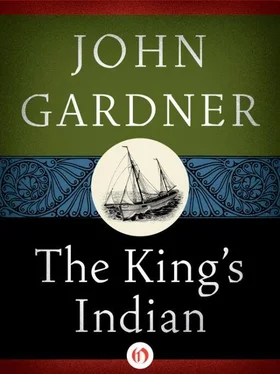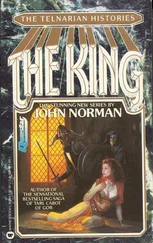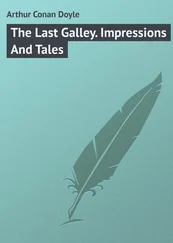“And so Wilkins, in his turn, fell.
“In the dimly lighted oil-stinking hold, talking with bound, gagged Captain Dirge as if the old man could answer him, or would if he could, black Ngugi and I looking on, saying nothing, never guessing how dark the farce would turn, Wilkins laughed, half-sob, half-rage. The Captain was like a deadman, inwardly struggling — or so I imagined — to hurl from his beaten soul some hint of his former animal magnetism, but no muscle in all his seated, tightly bound body stirred.
“Wilkins drew his pistol, waved it at the Captain. Ngugi, unarmed, took one step closer.
“ ‘What would it mean,’ Wilkins said, ‘if I blew yer mighty brains from here to Java?’ ‘Wilkins,’ I said. But he raved on. ‘If Creation is nothing but blind chance — mind this, milord — then the highest thing I can aspire to become is an impulse, a mindless whim, whether terrible or lovely.’ Wilkins laughed, wet-eyed. ‘So it is, milord. Seamen, engendering spirit, unite! Follow me, lads! Rise out of civilization, the cool marble halls of mere reason, convention, the sickness of orthodoxy.’ He bent closer to the Captain, still waving his pistol. ‘We’ve cut ourselves off. That’s the secret, Captain. Ye’ve said so yerself. Our skulls seal out the universe. Very shrewd, sir. Shrewd observation!’ He suddenly tensed, like a man struck by a whip. ‘Ye’d have liked to change that, if ye could — you and yer Society. Ye’re a fool, Captain. We’re all of us fools. Yer glorious project — would ye hear about that?’ He gave a crazy laugh, and Ngugi flinched back, afraid again that the gun would go off. Wilkins howled, ’ ‘Twas a hoax, yer lordship! A ridiculous hoax! ‘Twas a hoax put together by two antic devils by the names o’ Tobias Cook and James T. Horner — aye! and a sailor who’d put in time with the Grampus, by name of Willie Burns, and a fourth man, fourth devil, the sly insider, a whimsical maniac known to the world as — Swami Havananda! Aye, sir. Himself! It’s him slipped the painting ashore for the copying — and as fine a copying as ever was seen to the west of the Paris forgeries. And no trouble, that, the forger being the same man as painted the original.’ He threw back his head, theatrical, and laughed. Ngugi moved. Wilkins swung the pistol at Ngugi, and he froze.
“Now Wilkins looked at the Captain again — the Captain still as death. Wilkins hissed: ‘And why? ye may ask me. Why this monstrous, unfriendly hoax? I have asked the same question a thousand times, yer majesty. Asked it every time I set down my foot on a spider’s back, and every time the sun rose fiery and lovely. Aye! And given a thousand answers, all contradictions. Because ye were absurd with yer talk about God and yer Society — outrageous with yer praying in the dark of the sea, and yer Bible-reading and yer hymn-singing, and yer deigning to preach to us lesser men that was kindly invited t’ave brandy in yer cabin and be told of the undisciplined and ignorant rabble and the aristocracy “not closed to men of genius”—which was not us, sir, ye made that clear! — absurd with yer mumbles of ghosts and yer beautiful daughter’s “impressions,” and no wonder, half-dead already of yer pale theosophy. Ye set yerself up as our better and gave us no choice but to tumble you — and not just me, the very owners of the ship, milord.’ He laughed, gone pale. ‘So I says to myself, “That’s why we done it.” But no sir, not so. I’d fain have believed you. That’s why. Aye. But I lie again. It was only from whim, sir. Monumental whim! Artistic impulse, the urge of the Creator. Eight million years ago, humpbacks tell us, fish took a notion to depart from the sea. Fearfully, Captain, glancing in alarm over scaly shoulders; but on they walked, our slimy gill-flopping grandfathers, lords of whim. They learned the strange trick of breathing air, separating one from the elements four, in defiance of God (Thor he called himself, and willed his fins into mammoth’s legs, then called himself Woden, and willed his crisp fish-head to brain-packed skull) — by whim, Captain, by meaningless whim, because nothing in the universe was firm. No, I lie again. I hoped ye’d outsmart us, prove yerself a leader. There ’tis. The hell with us! Ye were only a man, and it ain’t sufficient. We’ve cut ourselves off, sir. There’s the secret.’ Suddenly he was shouting, bellowing like a bull. ‘Now hear this, me glorious ship and crew! This is Wilkins speakin’! We’ve sealed out the world with our thinking about it, our lies and philosophies and grandiose fictions. I’m determined, as a worshipful Christian, to leak it back in!’
“Quickly, as if in fear of losing his nerve, in fear of another instant’s change of purpose — at the same time drawing his second pistol (but it was a joke, all of it, his last, most spectacular theater trick, and we his dupes, except that, finally, Swami Havananda was leveling with us) — Wilkins aimed and fired, and the Captain’s head flew open. The rest of him did not move, not so much as a twitch, but sat calm as a dead Tibetan, listening. There was no blood. Ngugi and I jerked our heads in amazement. The Captain’s head was full of springs and coils, and tubing for letting out smoke when he puffed on his heavy black pipe. A walking puppet, huge ventriloquist’s dummy — Wilkins’ own creation, or, rather, Swami Havananda’s. Even the blood on his beard was false — more trickery. Whim indeed! Then it came to me:
“ ‘Jeremiah!’ I shouted. ’That’s who old Flint is! No wonder he was always at the Captain’s side!’ It was all clear as day to me now, at last — Jeremiah’s wild excitement when he went with the Captain to visit other ships (no mean feat, that trick he played on them, just to keep his hand in — though he came back with sacks filled with money, his collection). ‘The devil!’ I whispered as the thing came still clearer, ‘why the God damned arrogant maniac!’ Wilkins must have known that, I understood then, must have suffered for years Flint’s icy scorn, and must have hated him. At last he’d gotten even, had slashed what little heart Flint had left by raping poor Miranda.
“But Wilkins said, ‘Devil! Ye make me laugh. Poor weak, slavish mortal, poor dupe, that’s old Flint. He’s hunted all his life for some holiness past magic. That’s what brought him here, out to the region of the Vanishing Isles. Oh, his power’s magnificent, no doubt about that, and his cynicism’s the highest quality, I can tell ye from long experience.’ He sneered. ‘It’s true he had a feeling it might be a hoax, and partly he came from professional interest: If somebody’s tricking him, his arrogance demands that he spy out who. But at bottom he came here believing, sir. Fact. Gullible and desperate as only the greatest magicians can be. “Surely not everything’s mere illusion!” cried he. He made men his slaves with his bunkum religion (“Ghost of Hiram Billings, speak!” Har, har!), but religion it was, in the end, that undid him.
“He gave me a wink. ‘Flint murdered the Captain ‘fore we ever come aboard, and the Captain’s poor foolish daughter too. I assisted him, of course; and assisted him again when certain crewmen found out, God rest their souls.’
“He was about to squeeze the trigger and dispatch himself— for no earthly reason, so far as I could see. Little as I liked him, I was horrified, sweating. My mind raced, and it occurred to me to say: ’Wilkins, where’s he now? — the blind man, Flint.’ (Miranda had asked that in the cabin, I remembered—‘Where’s Jeremiah?’ in terror but hiding to the last his identity. Cunning past cunning, a thousand times more wily than any Indian.)
Читать дальше











![John Bruce - The Lettsomian Lectures on Diseases and Disorders of the Heart and Arteries in Middle and Advanced Life [1900-1901]](/books/749387/john-bruce-the-lettsomian-lectures-on-diseases-and-disorders-of-the-heart-and-arteries-in-middle-and-advanced-life-1900-1901-thumb.webp)
